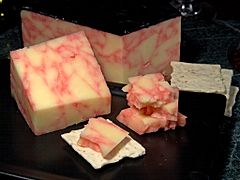Red Windsor (cheese) facts for kids
Quick facts for kids Red Windsor |
|
|---|---|
 |
|
| Country of origin | United Kingdom |
| Region | England |
| Source of milk | Cows |
| Texture | Semi-hard |
Red Windsor is a special kind of cheddar cheese from England. It's easy to spot because it has a unique look. This cheese is pale cream in color, but it's swirled with red lines. These red lines come from wine!
The cheese is made from cow's milk that has been pasteurised. This means the milk is heated to kill any harmful germs, making it safe to eat. The red swirls are created by adding a type of wine, often a Bordeaux wine, or sometimes a mix of port wine and brandy. This gives Red Windsor its cool marbled pattern and a slightly fruity taste.
Contents
Where Red Windsor Cheese Comes From
Red Windsor cheese is made in Leicestershire, a county in England. Specifically, it's produced by a company called Long Clawson Dairy. This dairy is located in a village called Long Clawson. They are well-known for making different kinds of English cheeses.
How Red Windsor Cheese is Made
Making Red Windsor cheese starts like many other cheeses. First, fresh cow's milk is collected and pasteurised. Then, cheesemakers add special ingredients to turn the milk into cheese curds. These curds are pressed to form the cheese.
The unique part comes next. Before the cheese is fully formed, the red wine or port and brandy mixture is added. It's carefully swirled into the cheese. This creates the beautiful red veins that run through the pale cream cheese. This marbling makes Red Windsor not only tasty but also very pretty to look at.
What Red Windsor Cheese Tastes Like
Red Windsor is a semi-hard cheese. This means it's not super soft like cream cheese, but it's not rock-hard either. It's firm enough to slice easily. The taste is usually mild and creamy, like a traditional cheddar. However, the added wine gives it a subtle, fruity, and slightly tangy flavor. It's a popular cheese for cheese boards and sandwiches.
See also
 In Spanish: Red Windsor para niños
In Spanish: Red Windsor para niños
 | Percy Lavon Julian |
 | Katherine Johnson |
 | George Washington Carver |
 | Annie Easley |

